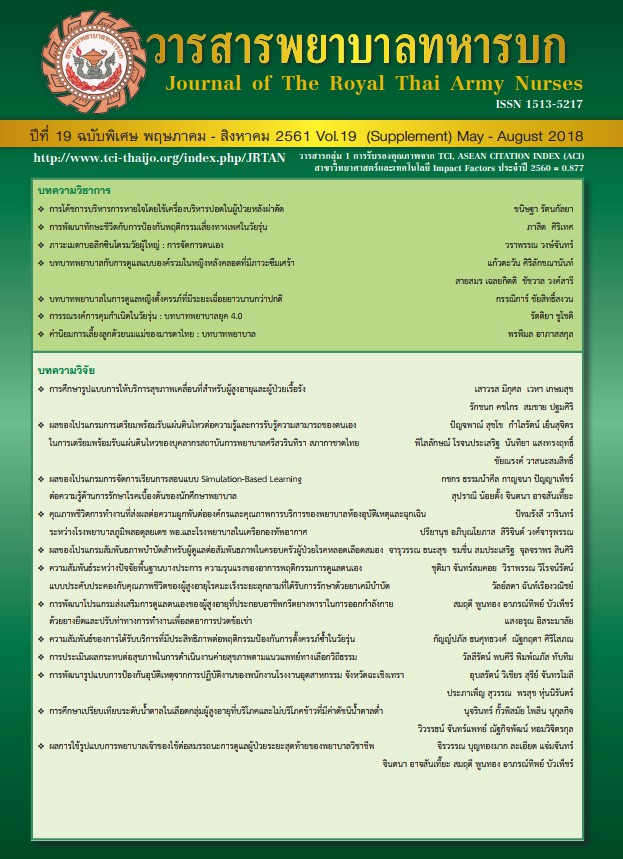Life Skill Improvement and the Prevention of Adolescent Risky Sexual Behaviors
Keywords:
life skills, adolescent risky sexual behaviorsAbstract
Adolescence is the age of physical, mental, and sexual changes. Teenagers are always curious and interested in the opposite gender. However, they still have misunderstanding about sex. Nowadays, we can reduce risky sexual behaviors among teenagers by learning many studies on life skills improvement to protect risky sexual behaviors, the teenager’s growth, factors that affect impropriate sexual behaviors, as well as the elements of life skills. Teenagers can have appropriate sexual behaviors by learning some elements of life skills. In fact, they can also apply it with many theories of behavioral sciences. They will learn those theories through the process of life skills improvement which is a cooperative learning with the student-centered learning activities. With these theories and learning process, teenagers can learn so that they can have the skills to protect themselves against risky sexual behaviors after all activities are completed. Therefore, life skills improvement in teenagers is so important that we should seriously study on the elements of the life skills and the process of the life skills improvement. The empirical evidences from the studies are very helpful for the educational personnel or other related organizations to use them as the guideline to design the activities that can improve the teenagers to have appropriate sexual expressions that can protect themselves against those situations that may cause them to have inappropriate sex. Finally, it is also the way to reduce many other problems and negative effects toward themselves, their families, and their society
Downloads
References
World Health Organization. The Global Strategy for Women’s, Children’s and Adolescents’ Health, 2016–2030.
Department of Mental Health, Ministry of Public Health. Manual for teaching life skills in junior high schools. Bangkok: Uranus Image Group Co. Ltd., 2011.
Bureau of Reproductive Health Department of Health Ministry of Public Health. Handbook of Sexual Education in the Family. Bangkok: Center for Media and Publication;2558.
Poonkham Y, Promprapat P, Paisanatchapong K, Samakkekarom R. The Guideline study for promoting youths’ health, preventing risk behaviors and health problems, 1sted. Nonthaburi: Bureau of Reproductive Health, Ministry of Public Healt;2010.
ฺBureau of Reproductive Health Department of Health Ministry of Public Health [Internet]. Reproductive health in adolescents. [cited 2018 Jun 1].
Chaikoolvatana C, Praditsathaporn C, and Kamkhieo W. Predictors of sexual risk behaviors among adolescents in Phayao province. J of Nursing and Education 2013;6:104-115.
Kaewviengdach C and Hirunwatthanakul P. Factors Associated with Sexual Risk Behaviours Among Secondary School Students in Nakhon Phanom
Province. Journal of The Royal Thai Army Nurses 2016;3:168-177. (in Thai)
Butcharoen W, Pichayapinyo P, and Pawwattana A. Factors Related to Sexual Risk Behavior among Thai Secondary School Students. J of Public health 2016;42:29-39.
Chamroonsawasdi K, Suparp J, Kittipichai W, Khajornchaikul P. Gender roles, physical and sexual violence prevention in primary extend to secondary school in Samutsakorn Province, Thailand. J Med Assoc Thai 2010;93:358-65.
Chudjuajeen S, Singhasame P and Wuttisukpaisan S. Effects of a Perceived Self-Effcacy Promoting Program for Life Skill Enhancement on Sexual
Health Behavior of Students. J The Southern College Network Journal of Nursing and Public Health 2017;4:268-280. (in Thai)
Tungsaengsakul S, Suwonnaroop N, Nakakasien P and Panitrat R. Effects of Sexual Health Life Skills Program on Perceived Self- Effcacy In Safe Sex of Early Adolescent Students. J of The Royal Thai Army Nurses 2017;2:119-128. (in Thai)
Punyachun N, Kengkarnpanich T, Tanskul S, and Apinantanawech S. Lifeskills development for preventing sexual intercourse among junior high school students. JHealth Education 2009;32(111):32-41.
Poonkum Y andHattanno K. Sex Education: Immunization The adolescent must get. J of Health Promotion and Environmental Health, 1998; 24: 12-9.
World Health Organization. Handout new module: Program on adolescent health for health-care providers. Geneva: World Health Organization; 2006.
Bureau of Reproductive Health Department of Health Ministry of Public Health. Handbook for Integrated Sex Education and Life Skills. Nonthaburi: Bureau of Reproductive Health, Ministry of Public Health 2015.
World Health Organization. Life skills education for children and adolescence in school. Geneva: World Health Organization;1994.
Bandura, A. (1997). Social Learning Theory. New Jersy: Englewood Cliffs.
Bandura, A. (1997). Self-Effcacy: The Exercise of Control. New York: W.H. Freeman and Company.
Kolb DA. Experiential learning: Experience as the source of learning and development. Englewood Cliffs, NJ: Prentice Hall; 1984.
Monkong L. The effectiveness of program developed from cognitive-experiential self theory and life skill technique on adolescent coping with stress [Doctor of Philosophy]. Bangkok: Chulalongkorn University; 2009.
Sirited P, Chamroonsawasdi K, Pitikultang S, Yodmai K. Effects of a Life Skills Program on Self-eff cacy to Prevent Teenage Pregnancy Among Female Secondary School Students in Ayutthaya Province. J Public Health 2017; 47(3): 241-254. (in Thai)
Woramalee S, Chamroonsawasdi Kanittha, Kittipichai W, and Auemaneekul N. Attitude on gender roles and life skills development program to prevent sexual risk behaviors among grade 5 primary school male students, Lopburi province. Thammasat medical Journal 2016; 16(3):456-466. (in Thai)
Downloads
Published
How to Cite
Issue
Section
License
บทความหรือข้อคิดเห็นใดใดที่ปรากฏในวารสารพยาบาลทหารบกเป็นวรรณกรรมของผู้เขียน ซึ่งบรรณาธิการหรือสมาคมพยาบาลทหารบก ไม่จำเป็นต้องเห็นด้วย
บทความที่ได้รับการตีพิมพ์เป็นลิขสิทธิ์ของวารสารพยาบาลทหารบก
The ideas and opinions expressed in the Journal of The Royal Thai Army Nurses are those of the authors and not necessarily those
of the editor or Royal Thai Army Nurses Association.






